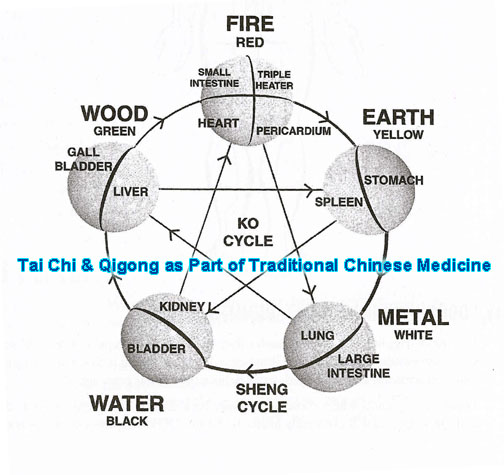Zang Fu Organ Energy Systems
- General information
- Another profound benefit Tai Chi and Qigong provide is a
gentle massaging of the internal organs. Because Tai Chi
moves the body in about 95 percent of the possible
motions it can go through, it not only clears the
joints of calcium deposits, but it also gently
massages the internal organs.
In Traditional Chinese Medicine (TCM),
this is a powerful therapy for optimum health.
TCM recognizes that the body is an integrated
whole whereby all the parts are connected by the
flow of Qi. In fact, the Chinese system of medicine
is built upon a Zang Fu graph, which shows how
organs interact with and depend on one another
for good healthy function.
The Zang Fu system uses a memory model,
applying each organ to one of the five elements of
the earth. The Chinese see the world as made of Earth,
Metal, Water, Wood, and Fire. The energy flow affects
different organs through the Sheng Cycle and the Ko
cycle. This figure shows how organs are interactive
and interdependent on one another for healthful function.
Therefore, because Tai Chi & Qigong massage our organs through gentle full rotations, they help balance all integrating activities of the Zang Fu systems (see below chart).

- Be Kind to Your Emotions
-
Acupuncture, herbal medicine, and Tai Chi/QiGong use the Zang Fu system to understand how the body, mind, and emotions integrate. A problem with a particular organ may have emotional symptoms. Likewise, a chronic emotional state may have a physical impact on the organs. The following list explains the Zang Fu connection between organs and emotions commonly related to imbalances with those organs or their energy channels:
Liver = Depression, anger
Heart = Excess joy (such as manic
behavior), excess mental
function
Spleen = Obsession
Lung = Anguish, grief, melancholy
Kidney = Fear, fright
- Modern acupuncturists often call the Qi meridians bioenergetic circuits
- T'ai Chi and QiGong affect the same energy flow that acupuncture does, although acupuncture can be better for acute problems, whereas Tai Chi is a daily tune-up. Therefore, acupuncturists often recommend T'ai Chi to their patients, and Tai Chi teachers recommend acupuncture to students with chronic or acute conditions, asSo Tai Chi and Qigong benefit the mental and emotional states, not only by encouraging us to let go of the day's problems by focusing on breath and movement, but in other ways as well.
Tai Chi and Qigong stimulate the organs with gentle massage, while stimulating the acupressure points on the feet and throughout the body, with its gentle relaxed postures.
The breathing in Tai Chi is full, yet effortless, encouraging internal releases of mental and emotional blocks that also help the internal Zang Fu systems become less restricted, more free flowing, and healthful on mental, emotional, and physical levels.
Chapter 4, "Expand the Mind and Lighten the Heart," will explain how Tai Chi and QiGong can provide mental and emotional healing.
- Sage Sifu Says
- If you go to a Traditional Chinese Physician, she may likely ask you about your emotions as well as your physical symptoms because emotional states may help lead her to understand which organ's energy is deficient or in excess.
